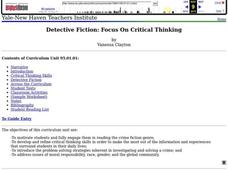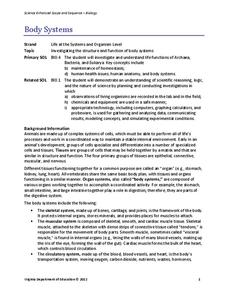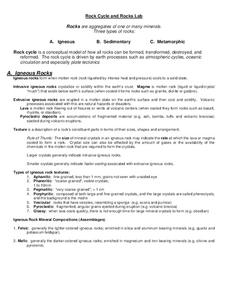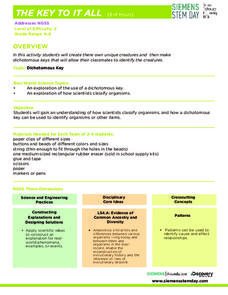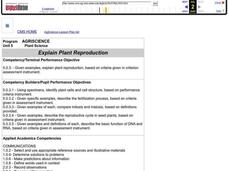Serendip
Homeostasis, Negative Feedback, and Positive Feedback
So many bodily activities depend on homeostasis! Give learners a solid background to understand the basic process of the human body. Scholars first examine negative feedback loops contributing to body temperature regulation and then a...
Curated OER
Detective Fiction: Focus On Critical Thinking
Turn your 6th graders into detectives while growing their love of reading. Using critical thinking skills, they will be able to describe the five basic elements of detective fiction, read detective novels, make predictions, use the...
Curated OER
The Art of Soap Making
Here is a nice, clean wrap-up lesson for your chemistry class when they are studying chemical reactions . They experiment with different oils to make soap. To make it more fun, they are to imagine that they are part of a soap testing...
Curated OER
Bioterrorism: Development of a "Superbug"
Students compare bacteria and viruses and their roles in biotechnology and bioterrorism. They outline fundamental steps of bacterial transformation and the possible selection processes to identify transformants. They discuss...
Curated OER
Vaccines
High schoolers explore and explain the role of vaccines in infectious disease, They emphasize immunological principles and viral/bacterial infection processes. Students explore the three main vaccine types: DNA vaccines ("gene gun"),...
Curated OER
The Good and Bad Bacteria
Students are able to name one kind of harmful bacteria and why it hurts us and also name one kind of helpful bacteria and how we use it. They describe the process of growing bacterial cultures in a lab. Students create a reasonable...
Curated OER
Incorporating 3D Visualizations into Your Classroom
Students make observations through 3-D visualizations. They explore scientific and geologic processes through the use of 3-D pictures.
Curated OER
From Gene to Protein
Here is a detailed presentation to assist in your lectures on the difficult topic of genetic transcription. The history, discovery, and scientific breakthroughs will spark interest. The last 15 slides deal with the biochemistry and...
California Academy of Science
What Would Happen?
Nothing says classroom fun like an invertebrate and a magnifying glass! Snails, earthworms, and roly-poly bugs become the center of attention as pint-sized investigators hone their inquiry and observation skills. They are guided through...
Virginia Department of Education
Body Systems
The human body is an amazing thing! Explore the body with your high school class as they investigate each system in detail. They learn components of each organ system and disease processes that can negatively affect general health and...
University of New Orleans
Rock Cycle and Rocks Lab
Science rocks! Explore three types of rocks and the rock cycle with an igneous rocks experiment. Pupils discuss textures, composition, and learn how melts are formed from the Earth's crust. They weigh materials using a scientific scale...
National Institute of Open Schooling
Ionic Equilibrium
Scientific studies show the older we get, the more acidic we become. The activity extensively teaches high schoolers about acids and bases. By the end of the 14th installment of 36, they can define and explain three concepts of...
Channel Islands Film
Arlington Springs Man: Lesson Plan 2
West of the West's documentary Arlington Springs Man and a two-page scientific article about the same topic provide the text for a reading comprehension exercise that asks individuals to craft a one page summary of information gathered...
NOAA
Wet Maps
How do oceanographers make maps under water? Junior explorers discover the technologies and processes involved in creating bathymetric maps in part three of a five-part series designed for fifth- and sixth-grade pupils. The lesson...
Science 4 Inquiry
The Ins and Outs of Photosynthesis
The most important chemical process on Earth is photosynthesis. Scholars explore the changes in the gases in our atmosphere as life on Earth developed. They create a model of photosynthesis and consider simple questions.
Discovery Education
The Key to It All
Which characteristics make organisms unique? Dichotomous keys simplify the process of classifying organisms by focusing on these unique characteristics. Young scholars learn how to use the dichotomous key flow chart by creating their own...
Serendip
Understanding How Genes Are Inherited via Meiosis and Fertilization
Bring the excitement of genetics to scholars with a dynamic hands-on meiosis modeling experience. During the activity, biologists follow step-by-step procedures to build chromosomes, model independent assortment, learn about crossing...
Curated OER
Plant Reproduction
Students plant seeds in order to investigate and explore the questions: "How do seed companies develop varieties of plants?" and "What is the ideal plant?" Students will study related vocabulary and sketch seeds as they emerge. Students...
Curated OER
A Photosynthesis Timeline
Science learners discover that scientific advancements come in increments. Beginning as an idea, changes and developments are influenced by available resources and current societal values. As an example, pupils examine the conclusions...
Curated OER
Koi Pond
Create this beautiful koi pond scene using watercolor paper, crayons, and paints. This would be a fantastic project to link to a scientific study of pond life or a historical study of Japanese culture.
Curated OER
The Industrial Revolution
Contrasting between the "Haves" and the "Have-Nots" of 18th-19th century Europe, this presentation explores the social and technological implications of the Industrial Revolution. Inventions, social trends, and scientific breakthroughs...
Curated OER
Water Cycle Reading and Writing
Here is a great way to get pupils to express a scientific concept in a fun way. After hearing the story of Walter the Water drop and learning facts about the water cycle, the class will write a creative expository piece describing what...
Perkins School for the Blind
The Germinator
How does a plant grow from a seed? Observe the process with a clever idea from the PBS television show ZOOM. Watch the video, then have your young botanists create their own germinators. The lesson described here is for visually impaired...
Curated OER
Plankton Parade
Plankton isn't just a tiny cartoon character, it's also a very important food source for animals around the world. Budding scientists discuss the types and functions of plankton, including where they are found, how they are caught, and...
Other popular searches
- Scientific Process Skills
- The Scientific Process
- Scientific Process Observe
- Scientific Process Food
- Scientific Process Bridges
- Scientific Process Measure
- Scientific Process Lab
- Scientific Process Vitamin C
- Science Scientific Process



